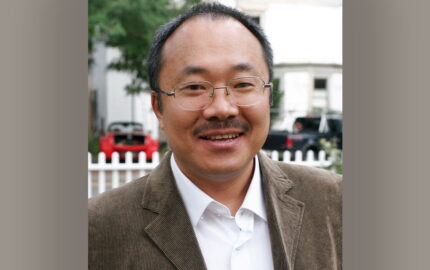CAMBRIDGE, MASS. (Sept. 11, 2003) — Barry Sussman, who led The Washington Post's day-to-day coverage of the Watergate scandal, has been named editor of the Watchdog Project at the Nieman Foundation for Journalism at Harvard University.
Sussman, currently a news media consultant based in the Washington, D.C., area, will oversee the project, including the development of a Web site to promote watchdog journalism in the United States and internationally and to provide information and resources for journalists.
The Watchdog Project seeks to encourage reporters and editors to monitor and hold accountable those who exert power in all aspects of public life. The project is funded by a gift from Murrey Marder, a retired chief diplomatic correspondent for The Washington Post and a Nieman Fellow in 1950.
"Bringing more focus on Watchdog journalism, particularly at a time when government's roles are expanding in so many aspects of daily life, is very much in keeping with the Nieman Foundation's mandate to 'promote and elevate the standards of journalism,'" said Bob Giles, the foundation's curator.
"Barry Sussman brings a deep understanding of watchdog journalism to the task. His knowledge, built on a lifetime of journalistic practice and leadership, will enable us to establish the Watchdog Project as an important place for journalists to examine critical questions, gain insights and exchange ideas," he said.
Sussman said, "Murrey Marder and Bob Giles have come up with a marvelous idea, and I'm looking forward to getting it started. We're going to be current and relevant, raising challenging questions which all serious journalists should be asking."
In recent years, Sussman has been a consultant with the Innovation International Media Consulting Group, working mostly with newspapers in Latin America and Europe. Since 1999 he has been co-editor and contributor to annual book-length "world reports" on trends in the newspaper industry, sponsored mainly by the Paris-based World Association of Newspapers.
Sussman was a Washington Post editor from 1965 to 1987. He was District of Columbia editor in 1972 at the time of the Watergate break-in and soon afterward was named special Watergate editor, focusing only on coverage of the developing scandal. David Halberstam, in his book "The Powers That Be," wrote that "from the start, the Post was unusually lucky. It had the perfect working editor at exactly the right level.
Sussman was not simply encouraging, he brainstormed the story, trying to put the pieces together, fitting them and refitting them until, finally, slowly, there was the beginning of a pattern."
In 1974 Sussman wrote "The Great Coverup: Nixon and the Scandal of Watergate." It was named one of the best books of the year by The New York Times and The Washington Post.
After Watergate, Sussman founded The Washington Post poll. In 1981, he was co-founder of the Washington Post/ABC News poll, and remained in charge of that poll for the Post until he left the newspaper in 1987. From 1983 until 1987 he wrote a column on public opinion for the Post's National Weekly edition. His second book, "What Americans Really Think," on public opinion and politics, was published by Pantheon in 1988. He wrote a third book, "Maverick, A Life in Politics," with Lowell P. Weicker, Jr., former U.S. Senator and governor of Connecticut, published by Little, Brown in 1995.
The Nieman Foundation at Harvard University administers the nation's oldest mid-career fellowship program for journalists. Since 1938 it has brought more than 1,000 American and international journalists to Harvard University for a year of academic study. In addition to the fellowships, the Nieman Foundation publishes Nieman Reports, the nation's oldest magazine devoted to a critical examination of the practice of journalism. It is also the home of the Program on Narrative Journalism.
Sussman, currently a news media consultant based in the Washington, D.C., area, will oversee the project, including the development of a Web site to promote watchdog journalism in the United States and internationally and to provide information and resources for journalists.
The Watchdog Project seeks to encourage reporters and editors to monitor and hold accountable those who exert power in all aspects of public life. The project is funded by a gift from Murrey Marder, a retired chief diplomatic correspondent for The Washington Post and a Nieman Fellow in 1950.
"Bringing more focus on Watchdog journalism, particularly at a time when government's roles are expanding in so many aspects of daily life, is very much in keeping with the Nieman Foundation's mandate to 'promote and elevate the standards of journalism,'" said Bob Giles, the foundation's curator.
"Barry Sussman brings a deep understanding of watchdog journalism to the task. His knowledge, built on a lifetime of journalistic practice and leadership, will enable us to establish the Watchdog Project as an important place for journalists to examine critical questions, gain insights and exchange ideas," he said.
Sussman said, "Murrey Marder and Bob Giles have come up with a marvelous idea, and I'm looking forward to getting it started. We're going to be current and relevant, raising challenging questions which all serious journalists should be asking."
In recent years, Sussman has been a consultant with the Innovation International Media Consulting Group, working mostly with newspapers in Latin America and Europe. Since 1999 he has been co-editor and contributor to annual book-length "world reports" on trends in the newspaper industry, sponsored mainly by the Paris-based World Association of Newspapers.
Sussman was a Washington Post editor from 1965 to 1987. He was District of Columbia editor in 1972 at the time of the Watergate break-in and soon afterward was named special Watergate editor, focusing only on coverage of the developing scandal. David Halberstam, in his book "The Powers That Be," wrote that "from the start, the Post was unusually lucky. It had the perfect working editor at exactly the right level.
Sussman was not simply encouraging, he brainstormed the story, trying to put the pieces together, fitting them and refitting them until, finally, slowly, there was the beginning of a pattern."
In 1974 Sussman wrote "The Great Coverup: Nixon and the Scandal of Watergate." It was named one of the best books of the year by The New York Times and The Washington Post.
After Watergate, Sussman founded The Washington Post poll. In 1981, he was co-founder of the Washington Post/ABC News poll, and remained in charge of that poll for the Post until he left the newspaper in 1987. From 1983 until 1987 he wrote a column on public opinion for the Post's National Weekly edition. His second book, "What Americans Really Think," on public opinion and politics, was published by Pantheon in 1988. He wrote a third book, "Maverick, A Life in Politics," with Lowell P. Weicker, Jr., former U.S. Senator and governor of Connecticut, published by Little, Brown in 1995.
The Nieman Foundation at Harvard University administers the nation's oldest mid-career fellowship program for journalists. Since 1938 it has brought more than 1,000 American and international journalists to Harvard University for a year of academic study. In addition to the fellowships, the Nieman Foundation publishes Nieman Reports, the nation's oldest magazine devoted to a critical examination of the practice of journalism. It is also the home of the Program on Narrative Journalism.


